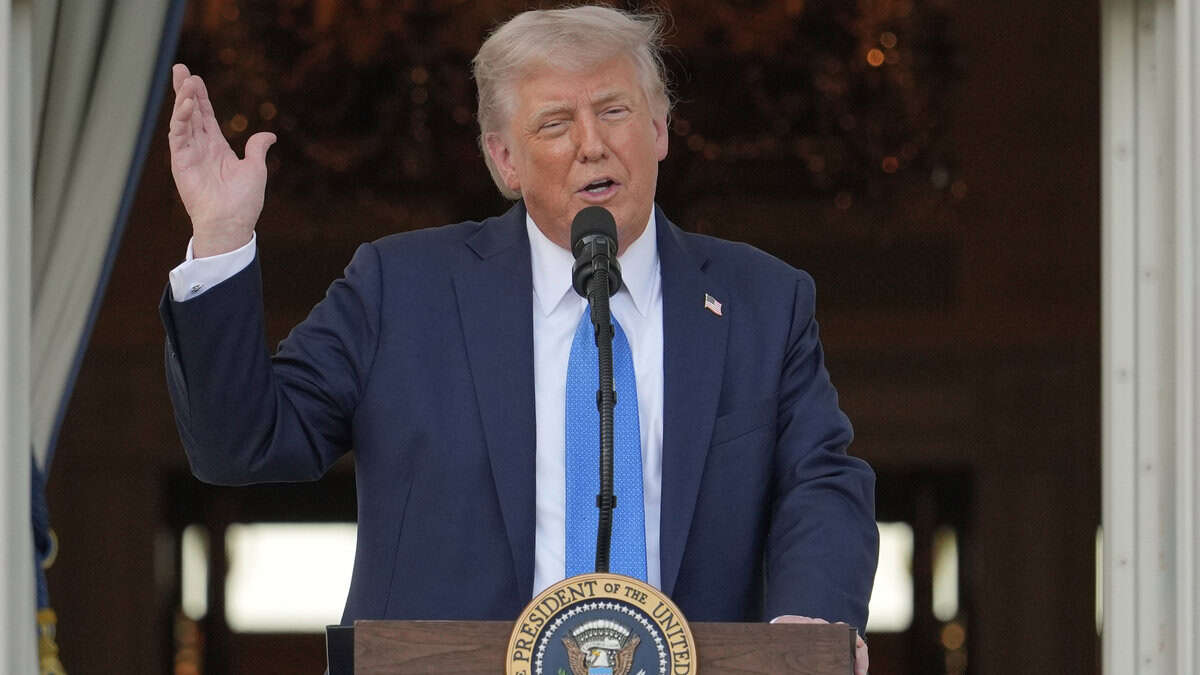
Beijing: US President Donald Trump on Wednesday announced that a deal with China “is done” after two days of talks in London, marking a turnaround in the trade war between the two major economies.
“Our deal with China is done, subject to final approval with President Xi (Jinping) and me,” Trump posted on his social media platform Truth Social.
His post came after the negotiating teams from both sides concluded two-day talks in London, where they agreed to resolve their trade disputes.
“Full magnets, and any necessary rare earths, will be supplied, up front, by China. Likewise, we will provide to China what was agreed to, including Chinese students using our colleges and universities (which has always been good with me!)” Trump said.
“We are getting a total of 55 per cent tariffs, China is getting 10 per cent. Relationships are excellent! Thank you for your attention to this matter,” he said.
“President Xi and I are going to work closely together to open up China to American Trade. This would be a great WIN for both countries!!!,” he said.
The London talks focussed on both sides reaching a deal on China resuming supplies of rare earth metals, the key elements needed to manufacture mobile phones, semiconductors and missiles, besides automobile production.
Following the talks, US Commerce Secretary Howard Lutnick said the deal between the two countries should result in restrictions on rare earth minerals and magnets being resolved.
While China blocked rare earth exports, the US restricted Beijing’s access to US goods such as semiconductors and other related technologies linked to artificial intelligence (AI).
“We have reached a framework to implement the Geneva consensus,” Lutnick told the media, according to a BBC report.
“Once the presidents approve it, we will then seek to implement it,” he said.
Rare earths are a group of metals consisting of 17 elements. Though present in several counties, their extraction is costly and messy, causing massive amounts of pollution.
According to the International Energy Agency, China accounts for 61 per cent of global mined rare earth production but controls 92 per cent of the global output.
Ahead of talks with the US, China last Saturday approved a certain number of export license applications for rare earth-related metals.
The approval was granted considering rising global demand for medium and heavy rare earth elements driven by industries such as robotics and new energy vehicles, a spokesperson of the Ministry of Commerce said in Beijing.
China’s recent restrictions on the exports of key metals caused widespread disruption in the manufacturing of automobiles and semiconductor chips in a host of countries, including India.
While China is negotiating with the US and the EU, Beijing reportedly has not yet responded to India’s request to resume exports of the key rare-earth elements.
The shortages were so acute that Japan’s Suzuki stopped production of its Swift model, according to reports from Tokyo.
Trump’s latest posts followed a phone call between Xi and him last week leading to the talks between the two countries in London.
The two negotiating teams finished their latest round of talks by announcing they had agreed in principle to a framework that each side would bring home for review by their respective leaders as the world’s two biggest economies attempt to get their trade-war ceasefire deal signed in Geneva last month back on track.
Beijing also took exception to US threats to revoke visas of thousands of Chinese students studying in the American Universities.
An official statement released by Xinhua in Beijing on Wednesday said both China and the US “made new progress in addressing each other’s economic and trade concerns” during the “candid and in-depth” dialogue.
Vice-Premier He Lifeng, who led the Chinese delegation, said that “China does not want a trade war, but it is not afraid of one”, according to the statement.
“The two sides should resolve economic and trade differences through equal dialogue and mutually beneficial cooperation. China is sincere in economic and trade consultations, but it also has its principles,” He was quoted as saying.
Lutnick, US Treasury Secretary Scott Bessent and Trade Representative Jamieson Greer led the US side in what was described as “the first meeting of the China-US economic and trade consultation mechanism”.
Both the US and China agreed to temporarily lower tit-for-tat tariffs after talks in Geneva last month.
The truce is due to last 90 days to provide time for the top two economies to reach a broader substantive agreement to end their tariff war.
Trump imposed 145 per cent of tariffs against the Chinese exports of about USD 439.9 billion and China retaliated with 125 per cent on American exports of about USD 143 billion.
However, the Geneva truce was disrupted after the US took exception to China not lifting the restrictions on the exports of rare earth metals.
Under the Geneva agreement, the US lowered tariffs imposed on goods from China from 145 per cent to 30 per cent while China dropped its retaliatory tariffs from 125 per cent to 10 per cent.
Analysts said China wouldn’t have agreed to lift restrictions on rare earths unless it received other meaningful concessions.
“Trump said China would supply magnets and rare earths but gave no clear explanation of what the US is offering in return, except for student visas,” Su Yue, principal China economist at the Economist Intelligence Unit, told Hong Kong-based South China Morning Post.
“But China wouldn’t have agreed unless it received other meaningful concessions. Trump seems to be framing the deal as a win for the US, but that could actually signal that China walked away with more,” he added.




